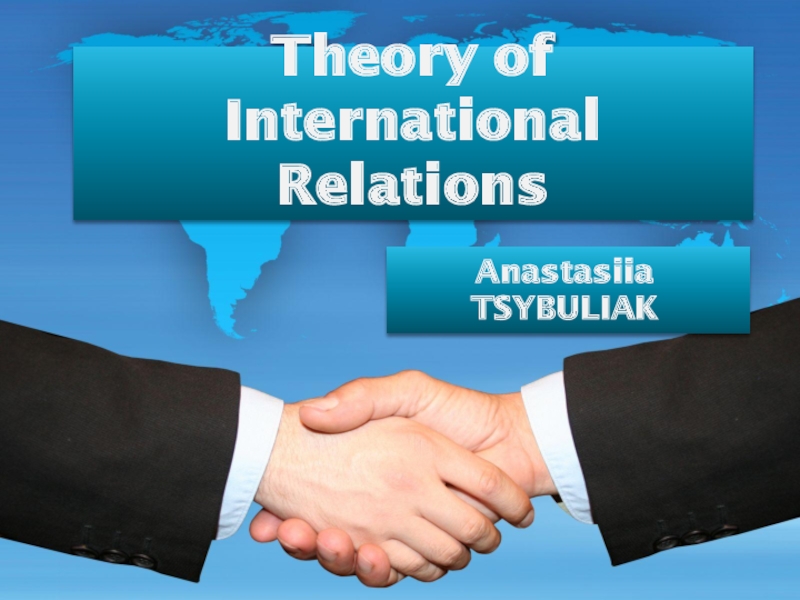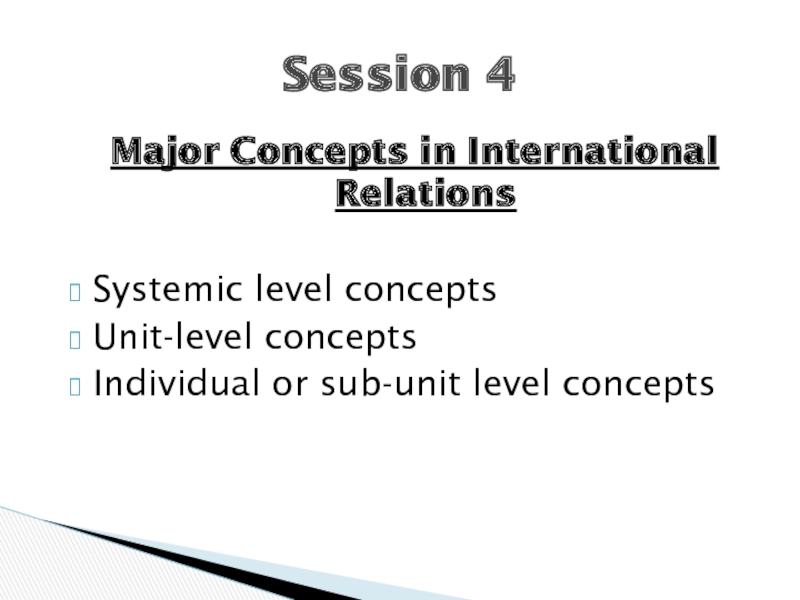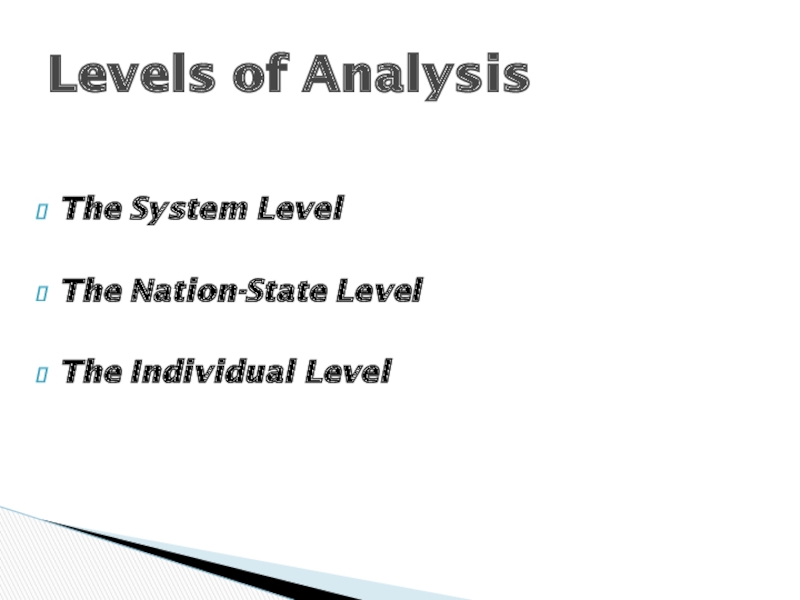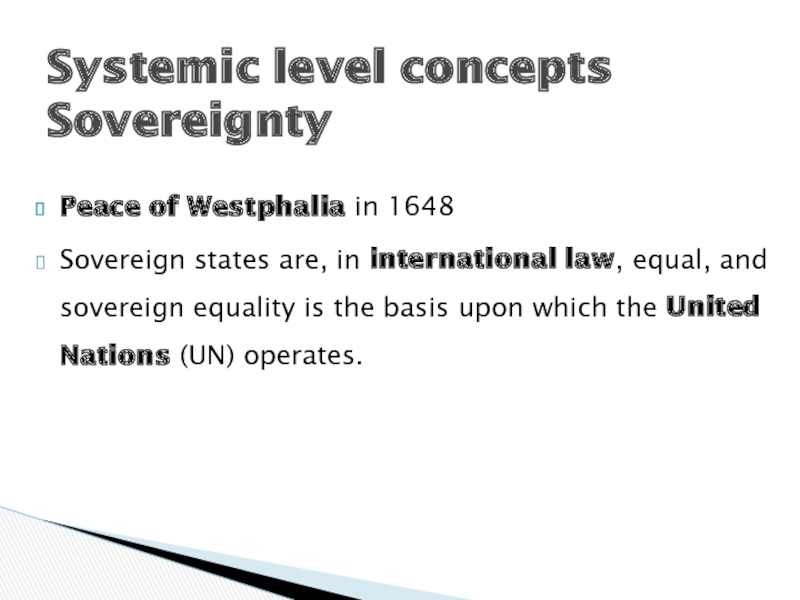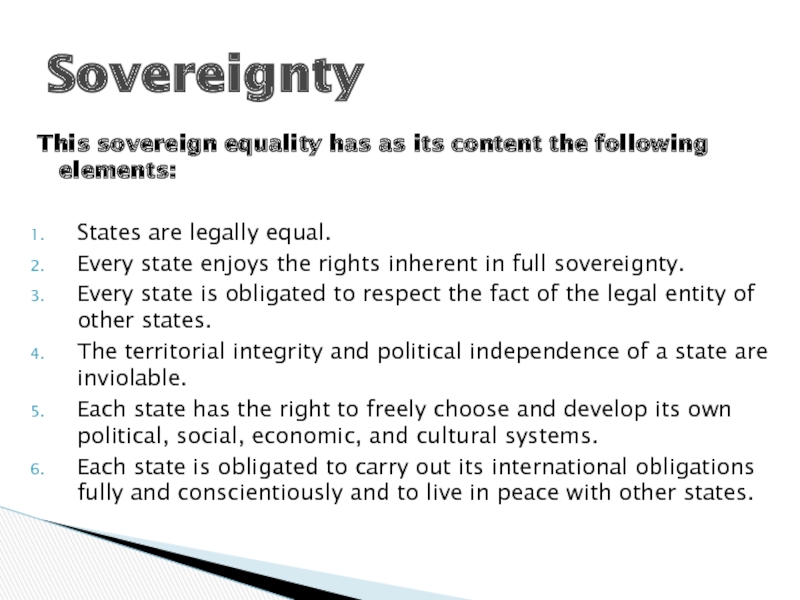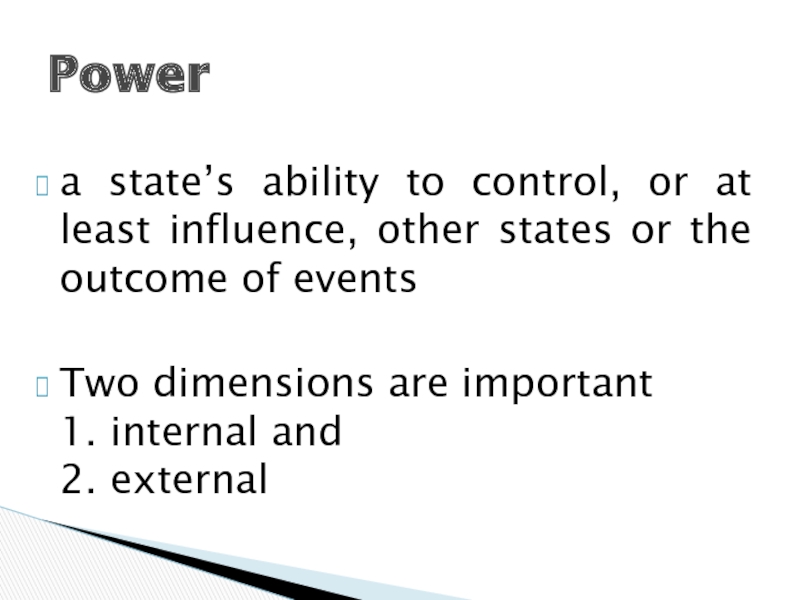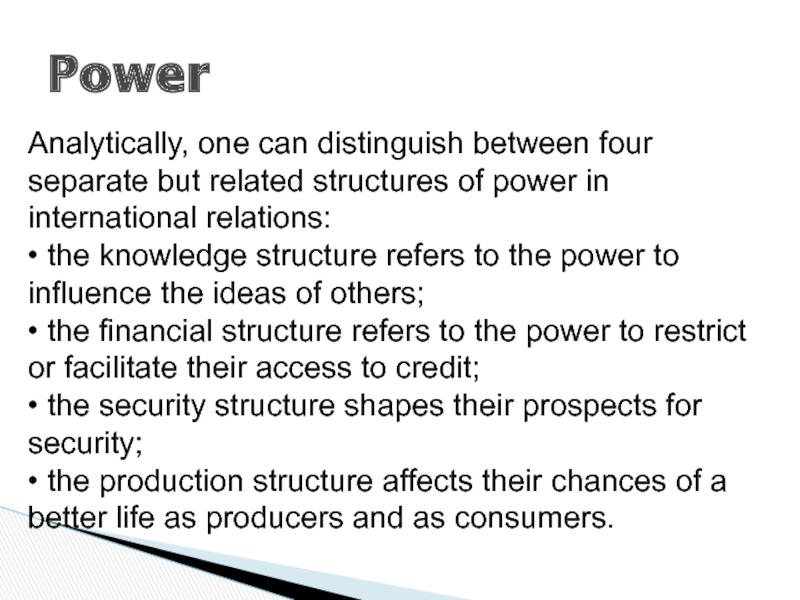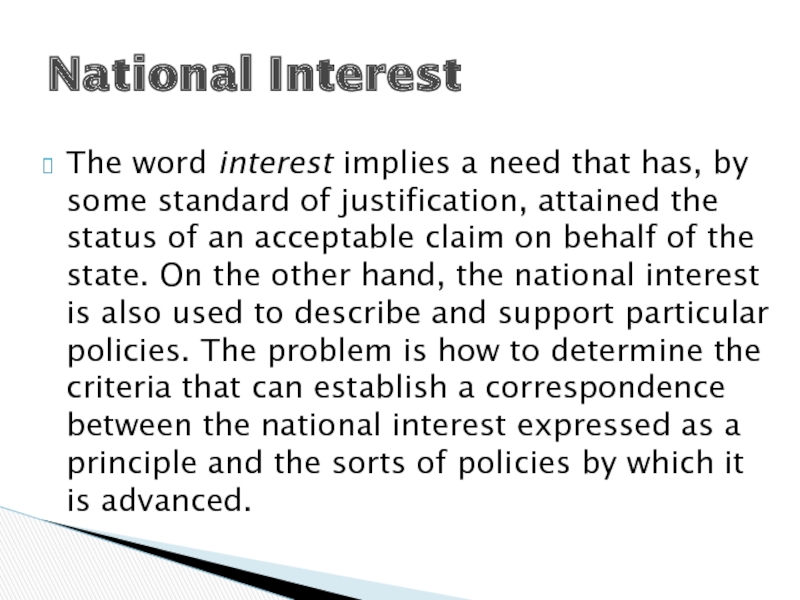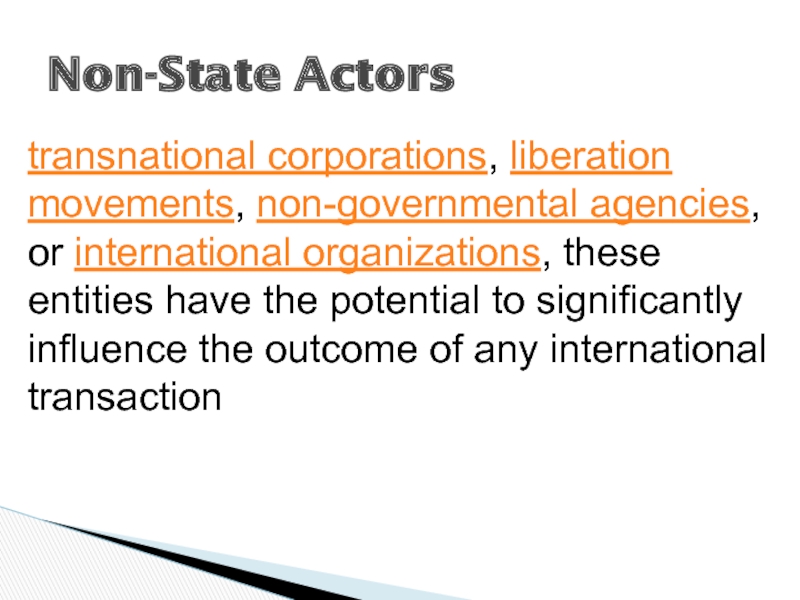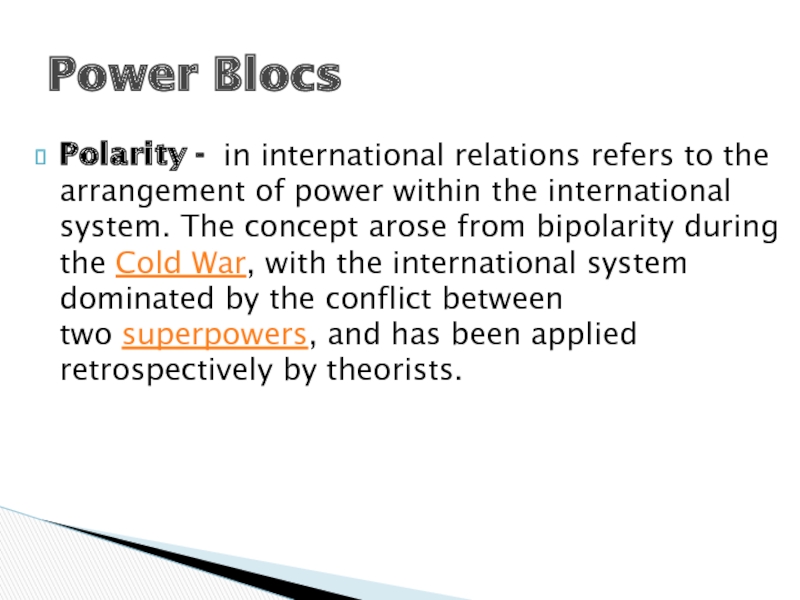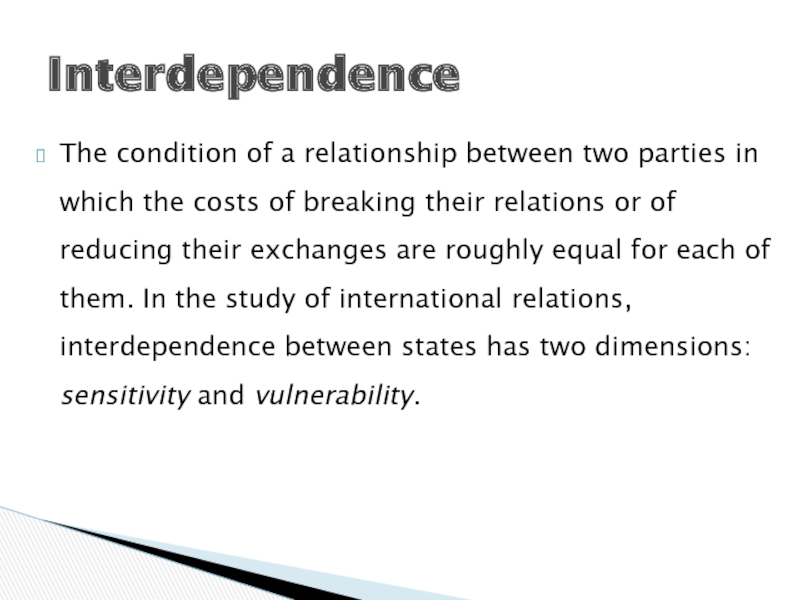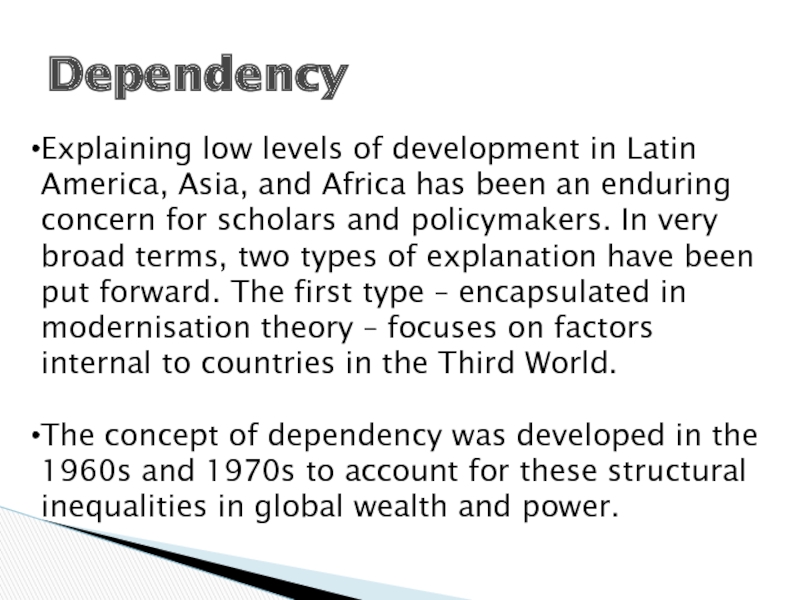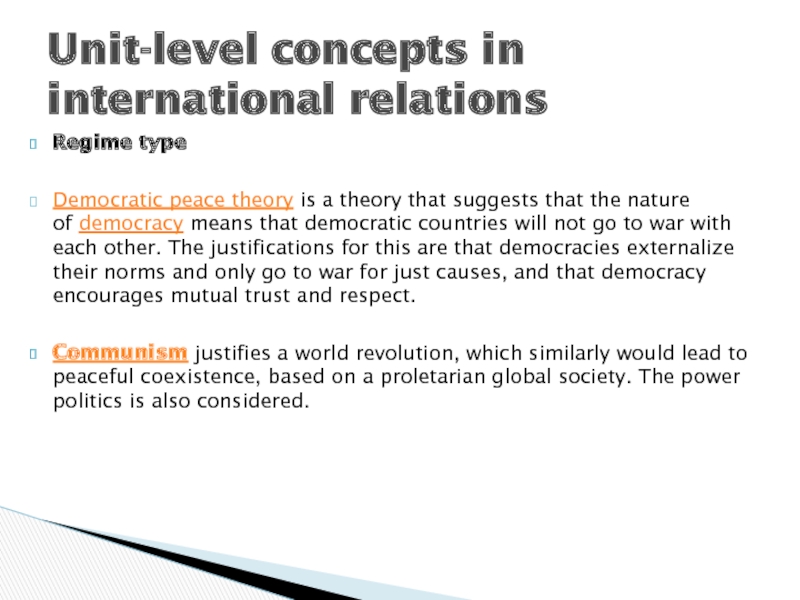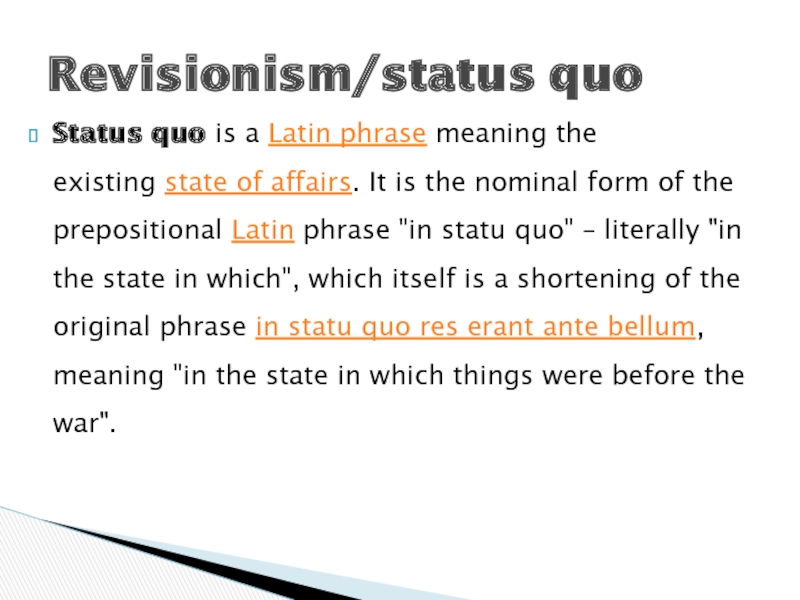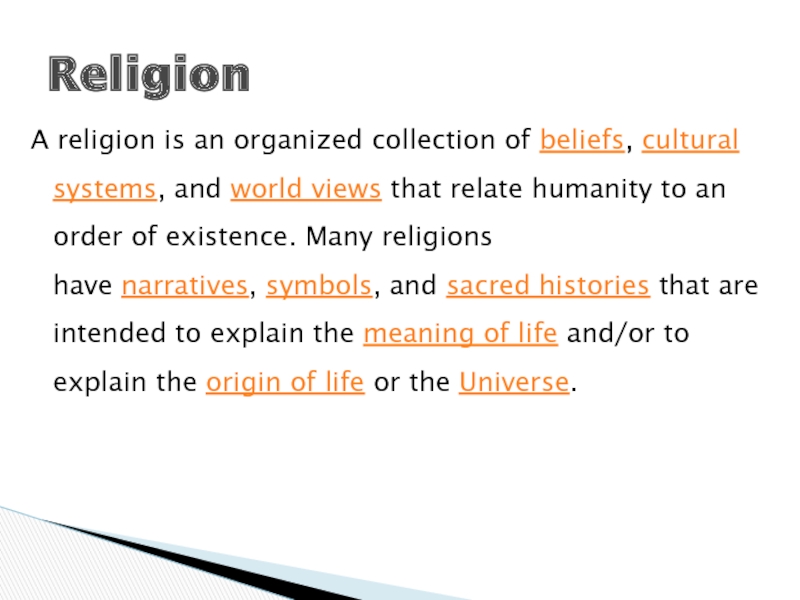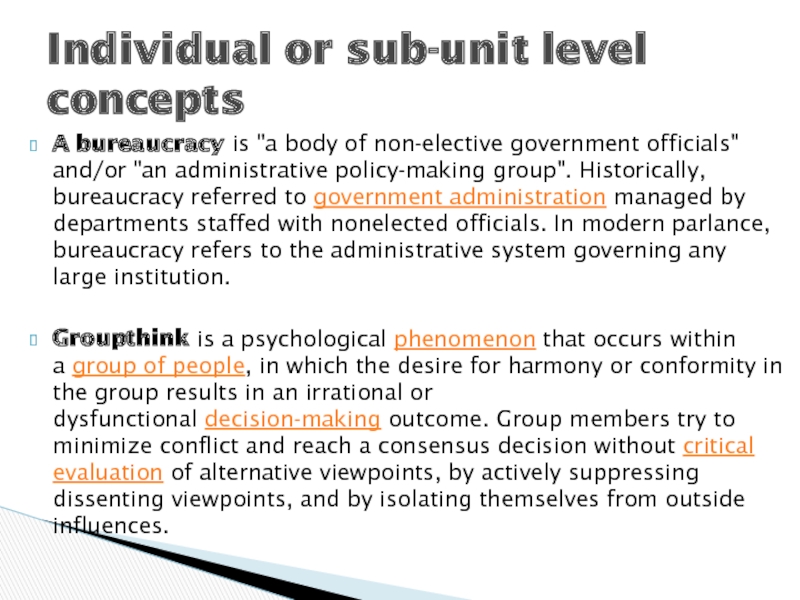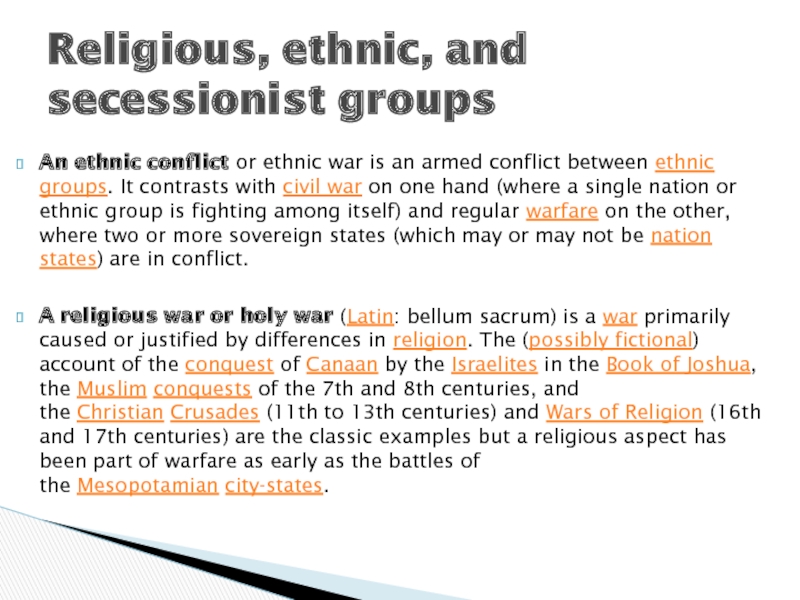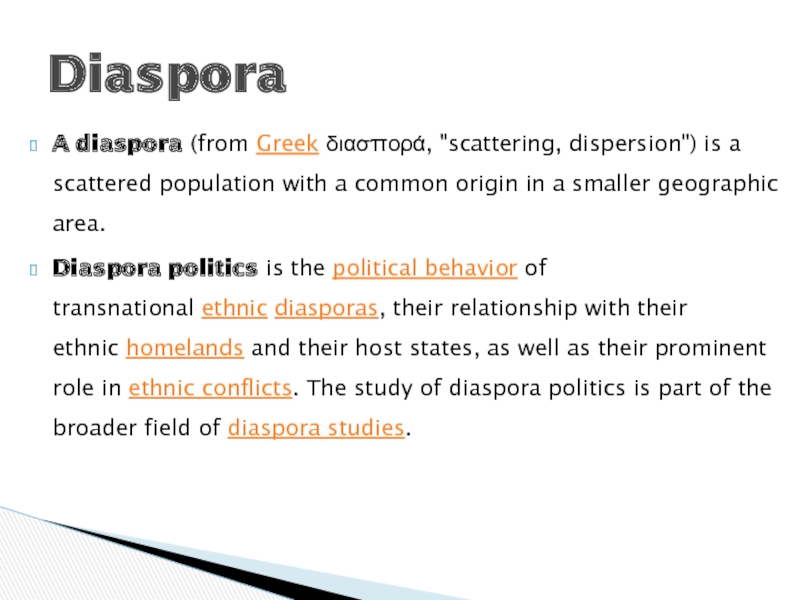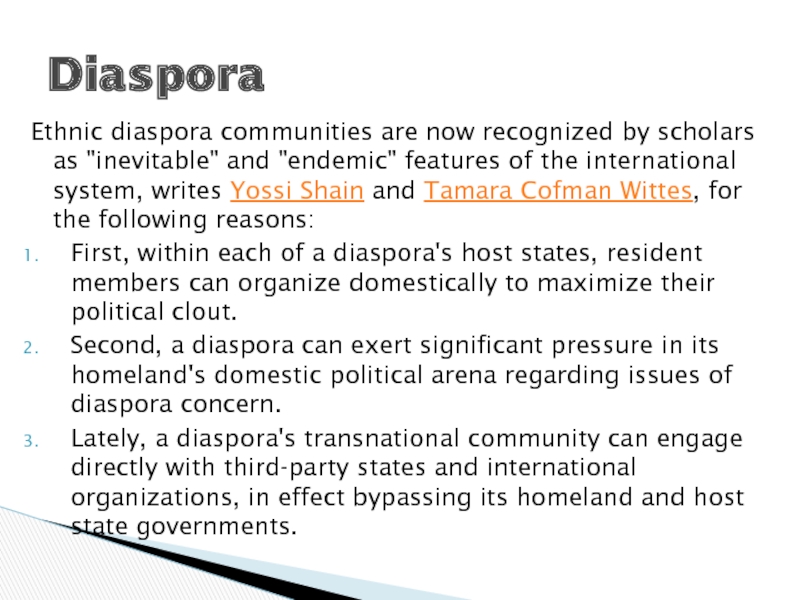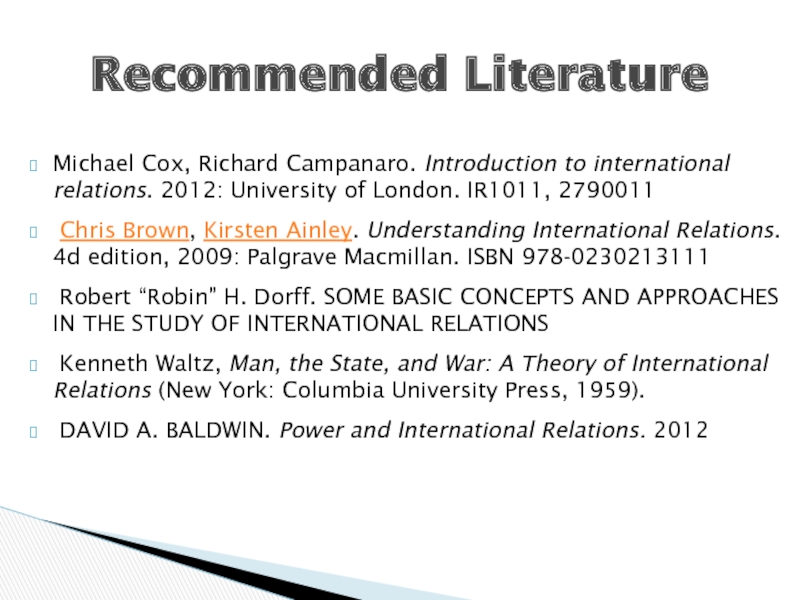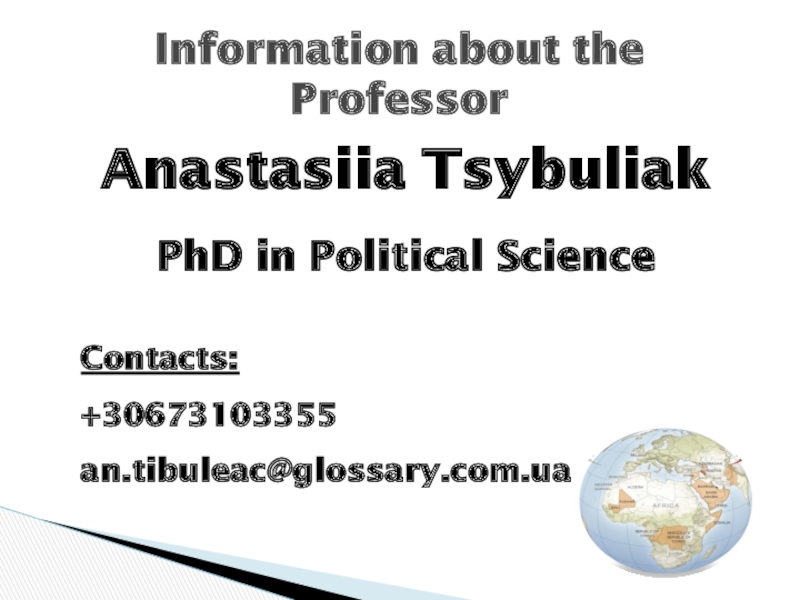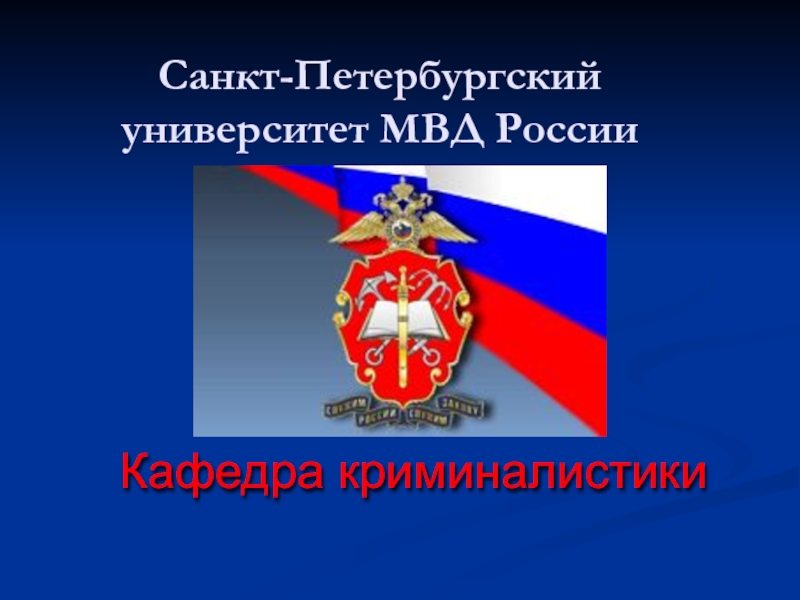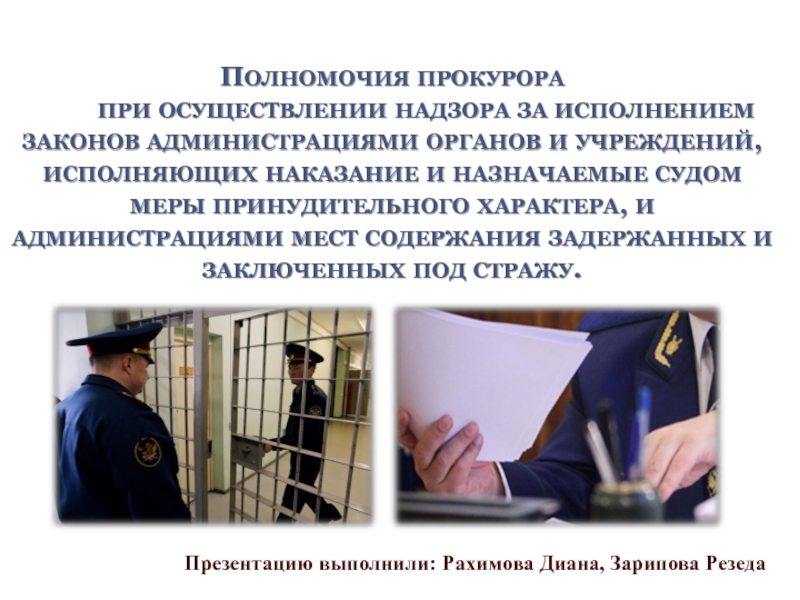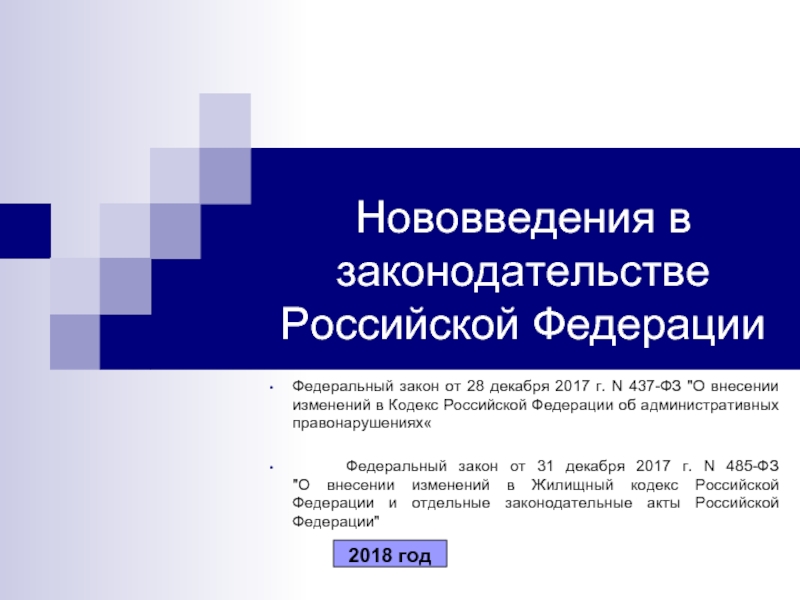- Главная
- Разное
- Дизайн
- Бизнес и предпринимательство
- Аналитика
- Образование
- Развлечения
- Красота и здоровье
- Финансы
- Государство
- Путешествия
- Спорт
- Недвижимость
- Армия
- Графика
- Культурология
- Еда и кулинария
- Лингвистика
- Английский язык
- Астрономия
- Алгебра
- Биология
- География
- Детские презентации
- Информатика
- История
- Литература
- Маркетинг
- Математика
- Медицина
- Менеджмент
- Музыка
- МХК
- Немецкий язык
- ОБЖ
- Обществознание
- Окружающий мир
- Педагогика
- Русский язык
- Технология
- Физика
- Философия
- Химия
- Шаблоны, картинки для презентаций
- Экология
- Экономика
- Юриспруденция
Theory of International Relations. Session 4 презентация
Содержание
- 1. Theory of International Relations. Session 4
- 2. Major Concepts in International Relations
- 3. The System Level The
- 4. Peace of Westphalia in 1648 Sovereign states
- 5. This sovereign equality has as its content
- 6. a state’s ability to control, or at
- 7. Power Analytically, one can distinguish
- 8. The word interest implies a need that
- 9. Non-State Actors transnational corporations, liberation movements, non-governmental
- 10. Polarity - in international relations refers to
- 11. The condition of a relationship between two
- 12. Dependency Explaining low levels of
- 13. Regime type Democratic peace theory is a
- 14. Status quo is a Latin phrase meaning the existing state of
- 15. A religion is an organized collection of beliefs, cultural systems, and world
- 16. A bureaucracy is "a body of non-elective government officials"
- 17. An ethnic conflict or ethnic war is an armed conflict between ethnic
- 18. A diaspora (from Greek διασπορά, "scattering, dispersion") is a scattered population with
- 19. Ethnic diaspora communities are now recognized by
- 20. Michael Cox, Richard Campanaro. Introduction to international
- 21. Information about the Professor Anastasiia Tsybuliak PhD in Political Science Contacts: +30673103355 an.tibuleac@glossary.com.ua
Слайд 2Major Concepts in International Relations
Systemic level concepts
Unit-level concepts
Individual or sub-unit
Session 4
Слайд 4Peace of Westphalia in 1648
Sovereign states are, in international law, equal,
Systemic level concepts
Sovereignty
Слайд 5This sovereign equality has as its content the following elements:
States are
Every state enjoys the rights inherent in full sovereignty.
Every state is obligated to respect the fact of the legal entity of other states.
The territorial integrity and political independence of a state are inviolable.
Each state has the right to freely choose and develop its own political, social, economic, and cultural systems.
Each state is obligated to carry out its international obligations fully and conscientiously and to live in peace with other states.
Sovereignty
Слайд 6a state’s ability to control, or at least influence, other states
Two dimensions are important 1. internal and 2. external
Power
Слайд 7
Power
Analytically, one can distinguish between four separate but related structures of
• the knowledge structure refers to the power to influence the ideas of others;
• the financial structure refers to the power to restrict or facilitate their access to credit;
• the security structure shapes their prospects for security;
• the production structure affects their chances of a better life as producers and as consumers.
Слайд 8The word interest implies a need that has, by some standard
National Interest
Слайд 9
Non-State Actors
transnational corporations, liberation movements, non-governmental agencies, or international organizations, these entities have the
Слайд 10Polarity - in international relations refers to the arrangement of power
Power Blocs
Слайд 11The condition of a relationship between two parties in which the
Interdependence
Слайд 12
Dependency
Explaining low levels of development in Latin America, Asia, and Africa
The concept of dependency was developed in the 1960s and 1970s to account for these structural inequalities in global wealth and power.
Слайд 13Regime type
Democratic peace theory is a theory that suggests that the nature
Communism justifies a world revolution, which similarly would lead to peaceful coexistence, based on a proletarian global society. The power politics is also considered.
Unit-level concepts in international relations
Слайд 14Status quo is a Latin phrase meaning the existing state of affairs. It is the nominal
Revisionism/status quo
Слайд 15A religion is an organized collection of beliefs, cultural systems, and world views that relate humanity to
Religion
Слайд 16A bureaucracy is "a body of non-elective government officials" and/or "an administrative policy-making
Groupthink is a psychological phenomenon that occurs within a group of people, in which the desire for harmony or conformity in the group results in an irrational or dysfunctional decision-making outcome. Group members try to minimize conflict and reach a consensus decision without critical evaluation of alternative viewpoints, by actively suppressing dissenting viewpoints, and by isolating themselves from outside influences.
Individual or sub-unit level concepts
Слайд 17An ethnic conflict or ethnic war is an armed conflict between ethnic groups. It contrasts with civil
A religious war or holy war (Latin: bellum sacrum) is a war primarily caused or justified by differences in religion. The (possibly fictional) account of the conquest of Canaan by the Israelites in the Book of Joshua, the Muslim conquests of the 7th and 8th centuries, and the Christian Crusades (11th to 13th centuries) and Wars of Religion (16th and 17th centuries) are the classic examples but a religious aspect has been part of warfare as early as the battles of the Mesopotamian city-states.
Religious, ethnic, and secessionist groups
Слайд 18A diaspora (from Greek διασπορά, "scattering, dispersion") is a scattered population with a common origin in
Diaspora politics is the political behavior of transnational ethnic diasporas, their relationship with their ethnic homelands and their host states, as well as their prominent role in ethnic conflicts. The study of diaspora politics is part of the broader field of diaspora studies.
Diaspora
Слайд 19Ethnic diaspora communities are now recognized by scholars as "inevitable" and
First, within each of a diaspora's host states, resident members can organize domestically to maximize their political clout.
Second, a diaspora can exert significant pressure in its homeland's domestic political arena regarding issues of diaspora concern.
Lately, a diaspora's transnational community can engage directly with third-party states and international organizations, in effect bypassing its homeland and host state governments.
Diaspora
Слайд 20Michael Cox, Richard Campanaro. Introduction to international relations. 2012: University of
Chris Brown, Kirsten Ainley. Understanding International Relations. 4d edition, 2009: Palgrave Macmillan. ISBN 978-0230213111
Robert “Robin” H. Dorff. SOME BASIC CONCEPTS AND APPROACHES IN THE STUDY OF INTERNATIONAL RELATIONS
Kenneth Waltz, Man, the State, and War: A Theory of International Relations (New York: Columbia University Press, 1959).
DAVID A. BALDWIN. Power and International Relations. 2012
Recommended Literature
